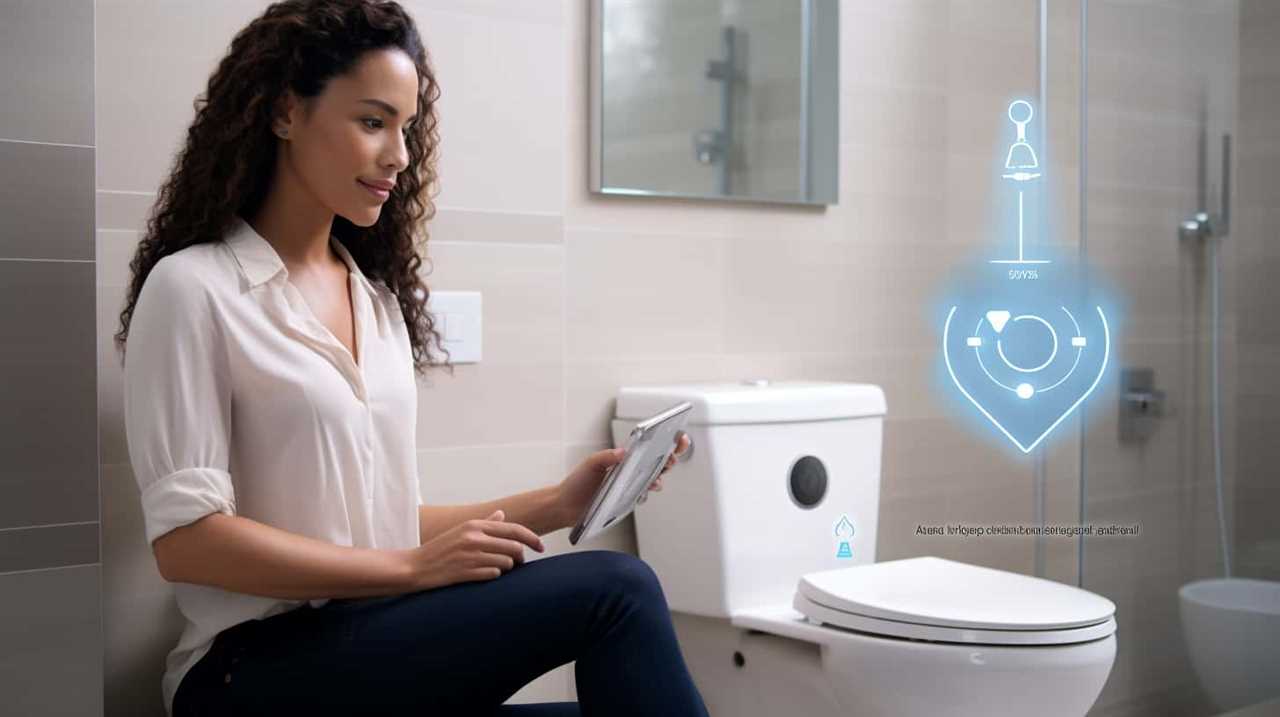Have you ever wondered why we feel the sudden urge to visit the restroom after a satisfying meal? Let’s delve into the complex workings of our digestive system to reveal the truth.
In this article, we’ll explore the fascinating role of hormones, the impact of food composition, and even delve into the neurological and psychological factors that influence this bodily function.
So, grab a seat and prepare to embark on a journey of understanding why nature calls at the most inconvenient times.
Key Takeaways
- Biological factors, such as the digestive system, gastric emptying, hormonal changes, and the gut-brain connection, can contribute to the urge to use the bathroom after eating.
- Cultural influences, including norms, practices, beliefs, and conditioning, can also play a role in the urge to use the bathroom after eating.
- Psychological factors, such as fear or anxiety, beliefs and expectations, stress and emotions, hypervigilance, and cognitive factors, can influence bathroom urges after eating.
- Managing bathroom urges can be achieved through mindfulness techniques, relaxation exercises, cognitive restructuring, gradual exposure, and seeking professional help if needed.

Vive Toilet Seat Cushion (Soft Cushioned Foam) – Easy Clean Soft Padded Bathroom Attachment – Elongated, Standard Seats – Comfort & Support Donut for Handicap Adults
ULTRA-SOFT CUSHIONED TOILET RISER: Experience superior comfort with the Vive toilet seat cushion, designed to relieve pressure points…
As an affiliate, we earn on qualifying purchases.
As an affiliate, we earn on qualifying purchases.
Digestive System Response
Our digestive system responds to food intake by initiating a series of processes that break down the food, absorb nutrients, and eliminate waste. This complex system is regulated by various factors, including the gut-brain connection and peristalsis regulation.

The gut-brain connection refers to the bidirectional communication between the gut and the brain, which allows them to influence each other. The brain sends signals to the gut to initiate peristalsis, the rhythmic contractions of the muscles that propel food along the digestive tract. In turn, the gut sends signals to the brain to communicate its state, such as hunger or fullness. This intricate connection ensures that our digestive system functions properly and responds appropriately to food intake.
Transitioning into the subsequent section about the role of hormones in digestion, we’ll explore how these chemical messengers further regulate and coordinate the digestive processes.

Nature's Bounty Lactobacillus Acidophilus Probiotic Supplement – Daily Probiotic for Women/Men Digestive Health, 100 Million Organisms, Vegetarian, 1 Serving per Day, 120 Tablets
SUPPORTS DIGESTIVE HEALTH (1): Nature’s Bounty Lactobacillus probiotic tablets provide 100 million active cultures; supporting your digestive health…
As an affiliate, we earn on qualifying purchases.
As an affiliate, we earn on qualifying purchases.
Role of Hormones in Digestion
Hormones play a crucial role in regulating the digestive processes after eating. The hormonal regulation of digestion begins as soon as we take our first bite.
One important hormone involved in this process is gastrin, which stimulates the release of stomach acid and enzymes for the enzymatic breakdown of food. Gastrin also promotes the contraction of the stomach muscles, aiding in the mechanical digestion of food.

Another hormone, cholecystokinin (CCK), is released by the small intestine in response to the presence of fats and proteins. CCK stimulates the release of enzymes from the pancreas and the contraction of the gallbladder to aid in the breakdown and absorption of fats.
These hormones work together to ensure efficient digestion and absorption of nutrients. Understanding the role of hormones in digestion is essential to understanding the impact of food composition on our digestive system.

Allura & Arcia 52 Stress Less & Self Care Cards – Mindfulness & Meditation Exercises – Anxiety Relief & Relaxation
52 EASY EXERCISES FOR EVERYONE: This unique Self Care Deck contains 52 extremely effective exercises for mindfulness, meditation,…
As an affiliate, we earn on qualifying purchases.
As an affiliate, we earn on qualifying purchases.
Impact of Food Composition
After consuming a meal, we may find ourselves needing to use the toilet due to the impact of the food composition on our digestive system. The composition of the food we eat plays a crucial role in determining how our gut microbiome functions and how efficiently our body absorbs nutrients.
The gut microbiome refers to the community of microorganisms living in our intestines. Certain foods, such as those high in fiber, can promote the growth of beneficial bacteria in our gut, leading to improved digestion and regular bowel movements. On the other hand, foods that are low in fiber or high in fat can slow down digestion and result in constipation.

Additionally, the composition of food affects the rate at which nutrients are absorbed by our body. For example, carbohydrates are quickly broken down into glucose and absorbed into the bloodstream, while proteins and fats take longer to be digested and absorbed.
Therefore, the impact of food composition on our digestive system and subsequent need to use the toilet is a result of the complex interplay between our gut microbiome and the efficiency of food absorption.

14-in-1 Gut Health with Probiotics, Prebiotics, Postbiotics & Digestive Enzymes for Women & Men, 60 Billion CFU Probiotics for Digestion, Strong Immunity, Skin, Complete Gut Health (120 Capsules)
【Comprehensive Gut Health Support】This 4-in-1 gut health supplement combines probiotics, prebiotics, postbiotics, and digestive enzymes to provide complete…
As an affiliate, we earn on qualifying purchases.
As an affiliate, we earn on qualifying purchases.
Neurological Factors Affecting Bowel Movements
The connection between our brain and our digestive system plays a crucial role in regulating bowel movements. This connection is known as the gut-brain connection. It involves complex communication between the brain and the gastrointestinal tract, which is mediated by a network of nerves, hormones, and neurotransmitters.
One key component of this connection is the autonomic nervous system, which controls involuntary bodily functions, including digestion and bowel movements. The autonomic nervous system is composed of two branches: the sympathetic and parasympathetic nervous systems.

The sympathetic branch is responsible for slowing down bowel movements, while the parasympathetic branch stimulates and promotes bowel movements. Dysfunctions in the gut-brain connection or the autonomic nervous system can lead to various gastrointestinal disorders, such as irritable bowel syndrome.
Understanding and managing these neurological factors are essential for maintaining healthy bowel movements.
Psychological Factors Influencing Bathroom Urges
Our mindset can greatly influence our urge to use the bathroom. Here are four psychological factors that can influence bathroom urges:
- Emotional triggers: Strong emotions like anxiety, stress, or excitement can affect the body’s digestive system and increase the need to use the bathroom. This can be due to the activation of the body’s fight-or-flight response, which diverts blood away from the digestive system.
- Cultural influences: Cultural norms and beliefs around bathroom habits can also play a role in bathroom urges. Some cultures may emphasize the importance of regular bowel movements and encourage immediate use of the bathroom after eating, while others may have different practices or beliefs.
- Conditioning: Over time, our bodies can become conditioned to associate certain cues or routines with the need to use the bathroom. For example, if someone consistently uses the bathroom after every meal, their body may develop a conditioned response to feel the urge at those times.
- Psychological factors: Our thoughts, beliefs, and perceptions about bathroom urges can also influence our need to use the bathroom. For instance, if someone has a fear of public restrooms or a belief that they’ll not find a clean bathroom when needed, they may experience increased bathroom urges in certain situations.
Understanding these psychological factors can help us better manage bathroom urges and promote healthy bathroom habits.

Frequently Asked Questions
How Long Does It Typically Take for Food to Pass Through the Digestive System?
Food transit time through the digestive system varies depending on factors such as the type of food consumed, individual metabolism, and overall health. It typically takes several hours for food to pass through the digestive system.
Can Certain Foods Cause More Frequent Bowel Movements?
Certain foods, depending on their fiber content, can increase bowel movements. Additionally, staying hydrated is important for healthy digestion. These factors can contribute to why we may need to use the toilet after eating.
Does the Digestive System Have Any Control Over How Quickly Food Is Digested?
Yes, the digestive system has control over how quickly food is digested. Factors like stomach acidity, enzyme production, and muscle contractions in the intestines all play a role in determining digestion speed.
Is There a Difference in Bowel Movements Between Genders?
When it comes to bowel movement patterns, hormonal influences can play a role. While there may be some differences between genders, it’s important to remember that everyone’s digestive system is unique and can be affected by a variety of factors.

Can Stress or Anxiety Affect the Frequency of Bowel Movements?
Stress and anxiety can have negative effects on digestion, leading to stress-related constipation. These conditions can disrupt the normal functioning of the digestive system, impacting the frequency of bowel movements.
Conclusion
In conclusion, the urge to use the toilet after eating is a normal and natural response of the digestive system. It’s triggered by various factors such as the release of hormones, the composition of the food consumed, and neurological and psychological factors.
While it may seem inconvenient at times, it’s important to remember that our bodies are designed to efficiently process and eliminate waste. So next time you feel the need to use the toilet after a meal, embrace it as a sign of a healthy digestive system at work.









